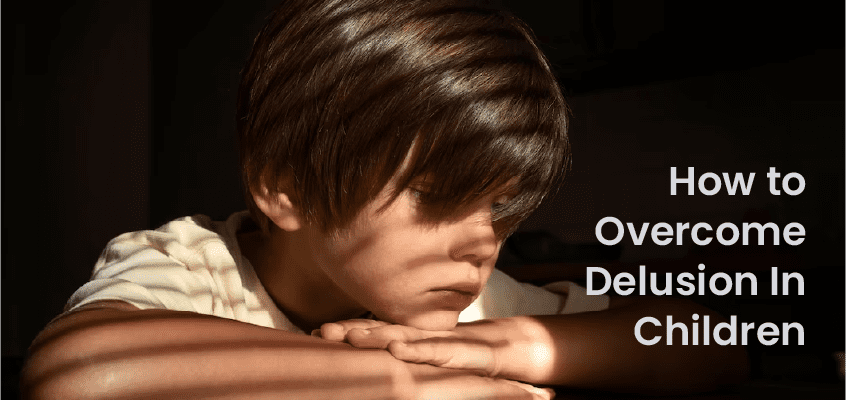Introduction
Delusion in children can present itself in many forms and can be caused by various factors, such as family life, school environment, culture, or even trauma. It’s crucial to recognize that this phenomenon can have positive and negative impacts depending on how it’s dealt with. Parenting is never easy, but dealing with delusional behavior has become especially difficult. In this blog post, we will explore the causes of delusion in children and offer some simple tips for parents on handling this issue in their children. We’ll also look into potential solutions to help kids overcome misconceptions and live healthier lives.
What is delusion?
Delusion is a false belief that is held despite evidence to the contrary. It can be challenging to overcome delusion in children as they may not be able to see the truth of their situation. However, some tips can help:
- Talk to them about their beliefs and explain why they may be false.
- Encourage them to question their beliefs and seek evidence to disprove them.
- Help them to understand that other people may not share their thoughts and that this doesn’t make them wrong.
- Most importantly, show them love and support regardless of what they believe.
- What are the causes of delusion in children?
There can be many causes of delusion in children. Sometimes it can be due to a mental disorder such as schizophrenia. Other times, it can result from something the child struggles with or a traumatic event. Medications could also cause it.Whatever the cause, delusions can be harmful to children. They can cause them to act out in violent or destructive ways. It’s essential to get help for children who are experiencing delusions so they can get treatment. Treating the problem from the root could help them grow better. Also, treating disillusion as an adult is complicated.If you are experiencing delusions, you must talk to your doctor or mental health professional. They will be able to help you understand what is going on and how to help your child best.
How to overcome delusion in children?
A delusion is a form of mental illness in which a person has false beliefs without connection with reality. DIllusionsin children can be challenging to overcome, but it is possible with the right approach.
Here are some tips to overcome delusion in children:
1. Help them understand what delusions are:
Explain to them that delusions are false beliefs not based on reality. They must understand that just because they believe something; it doesn’t make it accurate Help them see how their delusion might impact their life and the people around them.
2. Encourage open communication:
Be comfortable talking about delusions. Encourage them to share their thoughts and feelings with you so you can better understand their condition. Listening non-judgmentally and without trying to fix their problem is also essential.
3. Promote healthy coping mechanisms:
Teach your child healthy ways to deal with stress and anxiety. It may include things like exercise, relaxation techniques, and journaling. Help them to find activities that make them feel good and offer a sense of calmness and peace. Avoid any self-medication (including alcohol and drugs), as this will only make the delusions worse. Encouraging them to indulge in sports, arts, or hobby activities would be very helpful.
Important points to remember
There are a few key points to remember when trying to overcome delusion in children. The experience is different from dealing with the same situation in an adult.
- Try to get your child to see both sides of the story. Help them understand that there may be another perspective and others may not see things the same way they do.
- Encourage your child to talk about their beliefs with others, including adults, to help them become more aware of how their views compare to others.
- Help them understand that just because someone else doesn’t believe in something doesn’t mean it isn’t real. Just because someone else doesn’t see things the same way they do, doesn’t mean they’re wrong.
- Finally, try to instill a sense of critical thinking in your child. Help them learn how to question their own beliefs and think about things from different perspectives.
Talking to a professional is essential if you’re concerned about your child’s delusional thinking. A mental health professional can help your child understand their beliefs and how they compare to reality.
Conclusion
Delusion in children is a severe problem that can profoundly impact their lives. However, there are ways to overcome it. Children can learn to cope with their delusions and lead happy and healthy lives with the proper support and treatment. We hope our tips have helped you understand more about delusion in children and how to deal with it. If you suspect your child may be suffering from delusion, don’t hesitate to contact a professional for help.We Care about your place to seek professional and friendly advice. Our experts have dealt with children’s mental health and guided them throughout their journey, and we strive to approach them in a friendly environment.
References
- J. L. Despert, “Delusional and hallucinatory experiences in children,” Am. J. Psychiatry, vol. 104, no. 8, pp. 528–537, 1948.
- D. Cicchetti and V. Carlson, Child maltreatment: Theory and research on the causes and consequences of child abuse and neglect. Cambridge, England: Cambridge University Press, 1989.
- J. M. Najman et al., “Mothers’ mental illness and child behavior problems: cause-effect association or observation bias?,” J. Am. Acad. Child Adolesc. Psychiatry, vol. 39, no. 5, pp. 592–602, 2000.
- J. Read and N. Argyle, “Hallucinations, delusions, and thought disorder among adult psychiatric inpatients with a history of child abuse,” Psychiatr. Serv., vol. 50, no. 11, pp. 1467–1472, 1999





